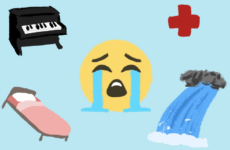On Monday, September 27, Choate’s faculty gathered for a seminar on cultivating body confidence and minimizing toxic diet culture on campus.
During the seminar, an external facilitator came in to lead a professional development presentation on disordered eating habits, their warning signs, the intersection of toxic body culture, diet culture, the “grind” mindset, and how all of that is exacerbated in the age of social media for young people in particular.
Especially amidst the pandemic, the number of adolescents struggling with disordered eating and exercise habits has skyrocketed. In part, this is due to an increase in time spent on social media where many influencers unwittingly encourage harmful habits. Additionally, many teens have turned to diet and exercise as ways to stay “productive” during pandemic lockdowns.
In light of this context, faculty were instructed on ways to be more in tune with the social-emotional needs of students and create a culture that is more supportive of all bodies. For example, it is critical to acknowledge and disrupt the mindset that labels certain foods as good or bad, healthy or unhealthy — or, in the case of Choate’s dining hall, green, yellow, or red.
“If I eat all red foods, I might feel bad about myself. That creates a value hierarchy among our food options,” said Ms. Kyra Jenney, the chair of the HPRSS department. “We shouldn’t place moral judgements on foods or the decisions we make, because we can internalize our choices and that leads to negative self-esteem.”
Although students’ struggles with eating may seem like an issue that’s not affected by the behavior of adults on campus, that isn’t always the case. Becca Alston ’22, president of The Body Project, a club on campus that aims to create a space for members to develop healthy body image and self esteem, noted how faculty impact student’s struggle with body image through sports. “A lot of athletes look to coaches for how they should treat their bodies, and there are sports where they’re encouraged to gain or lose weight when the focus should be on making sure the student is in a healthy place and taking care of themselves,” she said. “They’re not always conscious of the effects on the students when they give instructions like those.”
As such, the Health Center, Counseling Team, and Deans’ Office are thinking about ways they can facilitate body positivity programs on campus to address the challenges many students might be experiencing. In the meantime, faculty members are figuring out how to be involved in creating safe spaces and facilitating dialogue about issues related to eating.
Many students would like to see faculty be more invested in students’ well-being. Lisa Ji ’22 is a founding member of iloveme, an organization that raises awareness of the effects of mass media and advertisement on appearance anxiety. She said, “I think the faculty, especially in underformers’ dormitories, should be keener to students’ mental and physical wellness by caring for students’ sleep schedule and diet.”
Ji proposed that faculty and student leaders could collaborate on the issue, saying, “Peer Educators and other student leadership groups could partner with the faculty members to facilitate conversation among the students about these topics.”
Ms. Jenney agreed. “We really need wellness programming, especially coming into our second year of pandemic learning. We need to intentionally carve out time to have meaningful conversations on a variety of topics.”
However, she also acknowledged that pre-planned meetings can’t solve every issue. “In addition to formal programming, it’s important for us to be organically talking about these things together with students so it’s not always in the context of a pre-scripted meeting,” she said.
Some faculty believe that advisories — gatherings less formal than scheduled meetings but still fairly structured — could be apt to deal with these challenges. Ms. Amy Howland, a fourth-form dean and HPRSS teacher, added,“I’d love to see advisory groups tackle serious conversations about topics that are relevant to us. As far as a more interwoven aspect of Choate, one of the best forums for that narrative are advisory groups, because they’re composed of students that are familiar with each other and the adult(s) running it.”
Especially for those who are individually struggling, though, Alston hopes students will be more comfortable reaching out to faculty for help and advice. “Kids need to know that teachers are a resource for eating disorders and other body image issues,” she said. I think that people don’t think they can go to teachers.”
“Body confidence isn’t just something students are dealing with,” Ms. Jenney concluded. “These are things that our faculty struggle with too, so there’s an incredible moment for community connection and empathy there because this isn’t just a student experience.”
If you’re struggling with an eating disorder, please contact the Health Center or the National Eating Disorders helpline at 1-800-931-2237.



